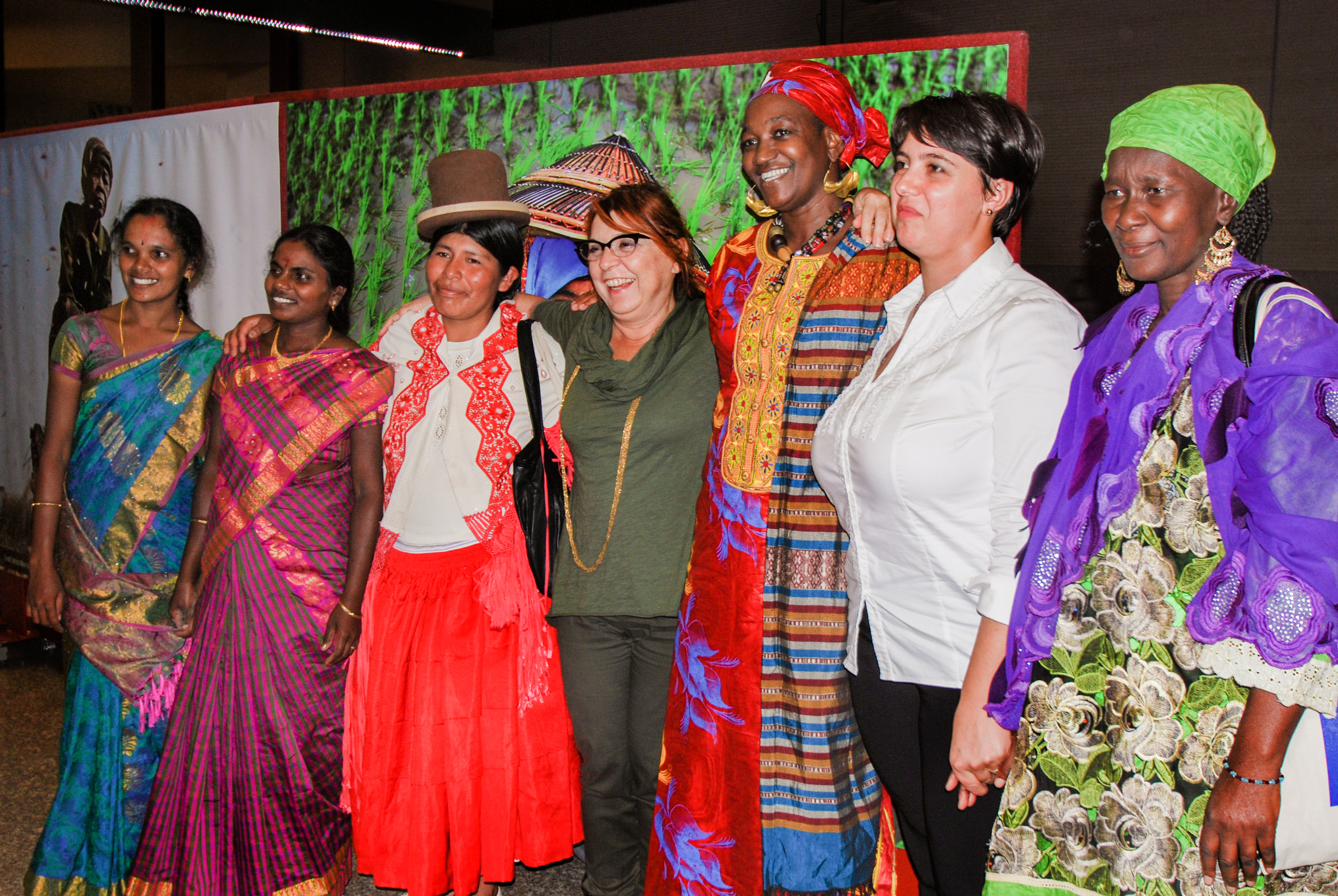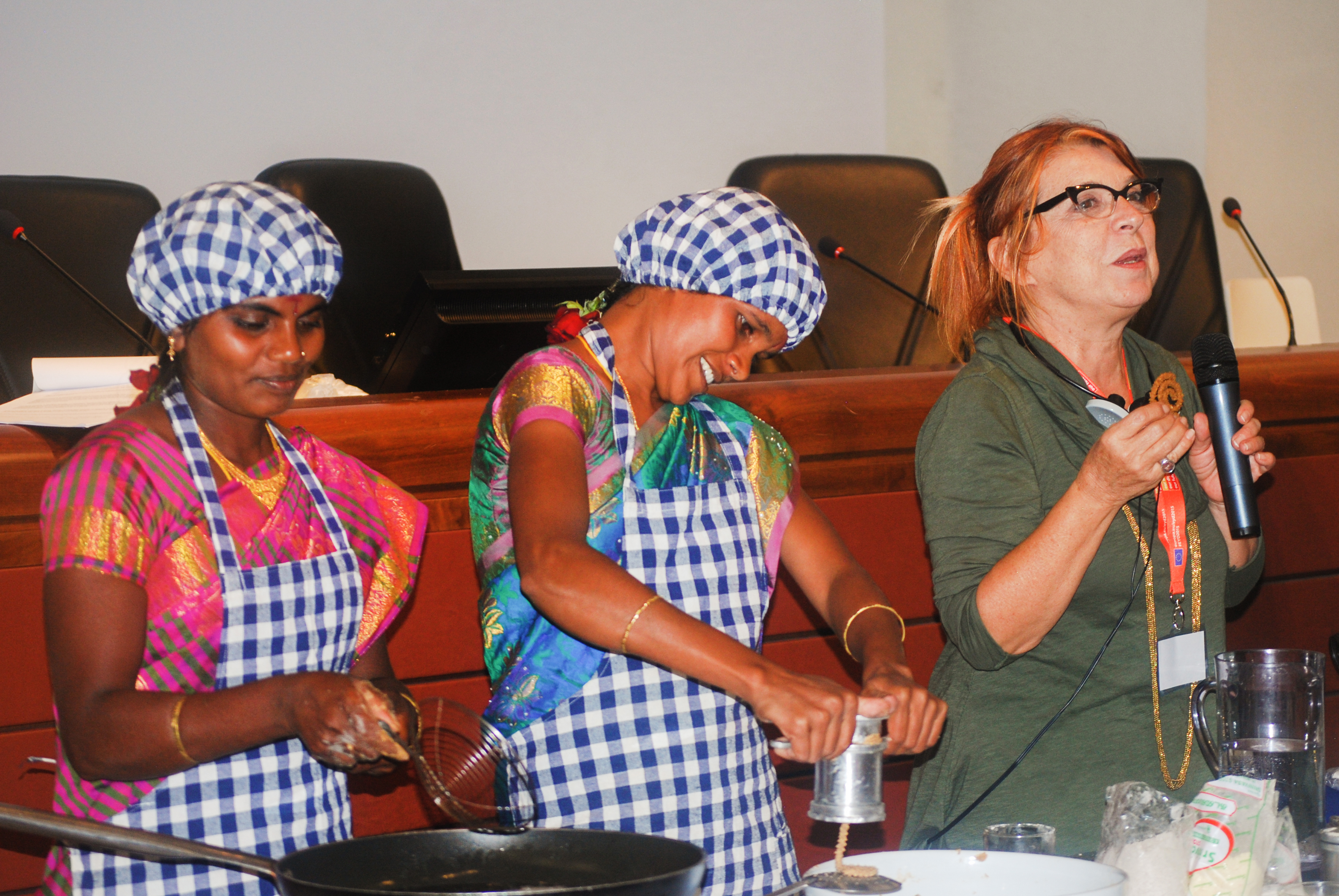Women from four corners of the globe share stories of food and empowerment in Milan
Five custodian farmers from Bolivia, India, Italy and Mali and numerous partners came to Bioversity International's co-organized event to voice their opinions and tell stories of women's empowerment through the use and marketing of agricultural biodiversity.
Agricultural biodiversity and women’s knowledge and actions regarding its use and conservation are often overlooked by research agendas. Women need to be recognized as custodians of agricultural biodiversity and empowered to better feed the world’s growing population. These are the themes that Bioversity International, the Italian Development Cooperation and other speakers echoed at a recent event ‘Agricultural biodiversity, value chains and women’s empowerment’ held in Milan, Italy on the 17th of September, 2015.
At the event, Bioversity International’s Director General M. Ann Tutwiler and Cristiano Maggipinto, Minister Plenipotentiary and coordinator of Italian Development Cooperation’s Expo 2015 initiatives were joined by representatives from FAO, IFAD, Slow Food Italia, Oxfam Novib, International Centre for Advanced Mediterranean Agronomic Studies (CIHEAM) and Fairtrade Italia and discussion centred on the urgent need to recognize and support the role of women in agriculture.
“The role of women in agriculture is essential and complementary to that of men. Women are often the natural custodians of biodiversity and they are the ones who by vocation or necessity hand down recipes and traditional ingredients. They conserve different species in their home gardens, manage community seedbanks and feed their families,” said Ann Tutwiler, Director General of Bioversity International.
The speakers urged for sturdy gender policies which fully embrace the ‘feminization’ of agriculture due to not only women’s centuries-long relationship with agriculture, food and nutrition but also to issues rising from men leaving women to farm as they seek employment in far-away urban areas.  Ann Tutwiler talked about a CGIAR-wide investment in gender-specific research since research considering the differentiated knowledge, skills, and priorities of men and women beneficiaries is more representative of local realities and can make a real difference.
Ann Tutwiler talked about a CGIAR-wide investment in gender-specific research since research considering the differentiated knowledge, skills, and priorities of men and women beneficiaries is more representative of local realities and can make a real difference.
Five custodian farmers from Bolivia, India, Italy and Mali flew to Milan to voice their opinions and tell their stories at the afternoon session of the event. For these five women, crops such millet, quinoa or medicinal plants have become essential parts of their lives and bring them satisfaction and a livelihood.
Custodian farmers Jayalalitha Easwaran and Malliga Seerangan who came to Milan from Chennai village in Tamil Nadu, India. At the event they spoke about their experiences in farming and using finger millet in different dishes and products which they now sell to local supermarkets and restaurants. With the help of their friends from a self-help group supported by the M. S. Swaminathan Research Foundation, they use the small grains to create everything from different organic flours to nourishing coffee-like drink mixes called 'Ragi malt'.
Boosted 15 years ago through the IFAD-funded and Bioversity International-led project, these women now speak of liberty and empowerment which they have found through running a business of their own. Jayalalitha and her group members farm up to six different varieties of millet on their personal farms, use clever machinery to remove the grains’ tough outer shell, and have currently got 11 organic products on market shelves across India. Throughout the years, this has allowed them to reach out to banks for loans, make a steady income and share seeds with other communities – something that was impossible before. They revealed that they use the money made from the sale of their products (Jayalalitha's 13 women large group makes about 3000 Rupees a month, which amounts to about 40 euros or US$ 43) in case one of the group members falls ill or for a gift or dowry when they get married.
At the end of the event, with the help of impromptu 'sous chef' M. S. Swaminathan Foundation's researcher Oliver King, Jayalalitha and Malliga entertained over 150 guests with a cooking demonstration where they used millet to cook delicious salty and crumbly Chakli, locally known as Murukku, which the participants had the opportunity to taste.
These custodian farmers conserve and use different species at a local level and yet their actions have a positive effect on food security and health, worldwide. Vivian Polar representing Bolivia’s PROINPA  Foundation was thrilled that quinoa custodians such as Doña Sebastiana Choque have linked up with national systems and have become key actors of conservation initiatives worldwide. Sebastiana and other women from the Bolivian side of Lake Titicaca grow and manage 180 varieties of quinoa (a pseudocereal resistant to drought) and 170 varieties of potato. Stefano Padulosi, Senior Scientist with Bioversity International, beamed with pride as he said that finally, the Bolivian government has recognized these women’s work and has affirmed that their conservation efforts are at the same level as those of the scientists of their national genebank.
Foundation was thrilled that quinoa custodians such as Doña Sebastiana Choque have linked up with national systems and have become key actors of conservation initiatives worldwide. Sebastiana and other women from the Bolivian side of Lake Titicaca grow and manage 180 varieties of quinoa (a pseudocereal resistant to drought) and 170 varieties of potato. Stefano Padulosi, Senior Scientist with Bioversity International, beamed with pride as he said that finally, the Bolivian government has recognized these women’s work and has affirmed that their conservation efforts are at the same level as those of the scientists of their national genebank.
~~~
Photo 1: Left to right, custodian farmers Jayalalitha Easwaran, Malliga Seerangan, Sebastiana Choque, Italian TV personality Syusy Blady, Professor Rokia Sanogo, custodian farmers Catuscia Sissa and Aminata Ouattara at the 'Agricultural biodiversity, value chains and women's empowerment' event. Credit: Bioversity International/P. Gallo
Photo 2: Custodian farmers Malliga Seerangan and Jayalalitha Easwaran cook Chakli while Italian TV personality Syusy Blady explains the process to the audience at the 'Agricultural biodiversity, value chains and women's empowerment' event. Credit: Bioversity International/P. Gallo
The millet and Andean-grain related work is supported by the CGIAR Research Program on Climate Change, Agriculture and Food Security (CCAFS), International Fund for Agricultural Development (IFAD), M.S. Swaminathan Foundation, Local Initiatives for Biodiversity, Research, and Development (LI-BIRD), Nepal Agricultural Research Council, Action for Social Advancement (ASA), Gene Campaign Partnership
